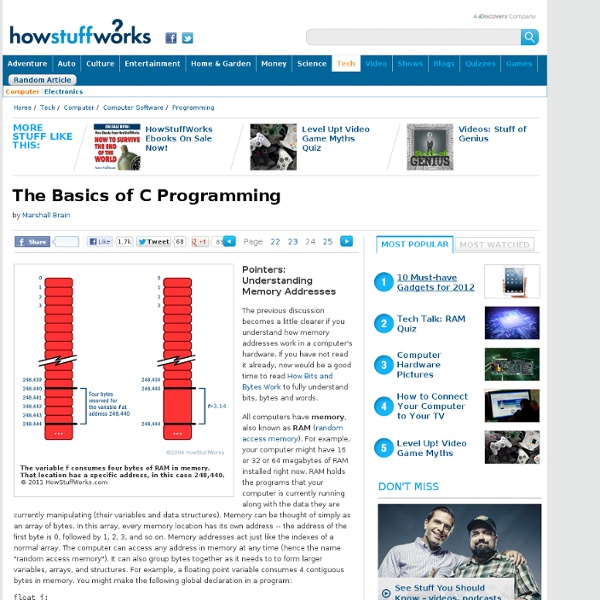The Basics of C Programming"

http://computer.howstuffworks.com/c23.htm
Mastering recursive programming
For new computer science students, the concept of recursive programming is often difficult. Recursive thinking is difficult because it almost seems like circular reasoning. It's also not an intuitive process; when we give instructions to other people, we rarely direct them recursively.
HTML5 and CSS3 Web Page Tutorials
This post is a roundup of latest free web design resources released during the month of March. This collection includes patterns, icons, themes, and… Continue Reading →
How to Think Like a Computer Scientist — How to Think Like a Computer Scientist: Learning with Python 3
Version date: October 2012 by Peter Wentworth, Jeffrey Elkner, Allen B. Downey, and Chris Meyers (based on 2nd edition by Jeffrey Elkner, Allen B. Downey, and Chris Meyers)
Ask the iTunes Guy: iTunes tips 101
[Ask the iTunes Guy is a regular column in which we answer your questions on everything iTunes related. If there’s something you’d like to know, send an email to the iTunes Guy for consideration.] I get lots of questions about some of the basics of iTunes.
Become a Programmer, Motherfucker
If you don't know how to code, then you can learn even if you think you can't. Thousands of people have learned programming from these fine books: Learn Python The Hard Way Learn Ruby The Hard Way
Pointer Basics
This document introduces the basics of pointers as they work in several computer languages -- C, C++, Java, and Pascal. This document is the companion document for the Pointer Fun with Binky digital video, or it may be used by itself. This is document 106 in the Stanford CS Education Library. This and other free materials are available at cslibrary.stanford.edu. Some documents that are related to this one include... Section 1 -- Pointer Rules
Learning How to Code Has Never Been Easier - StumbleUpon
Programming isn’t just a niche specialization anymore, rather a necessity for tech-professionals regardless of the industry in which they work. Thankfully for them, it couldn’t be any easier.As such, there’s a big push lately to make coding literacy more widespread among the general populace. Even Mayor Bloomberg is getting in on the act, pledging to learn basic coding in 2012 as his New Year’s resolution. For those who want to learn to code, there are a number of online school coding programs that can guide them through the process. The main players are Codecademy, Team Tree House and Code Year, each with their own strengths, weaknesses and selling points—all who make it easy.
YouTube Playlists for Learning Programming
YouTube has been very good platform for learning any thing. Earlier you have seen 400+ courses on YouTube and 130+ NPTEL courses. There are few more courses especially about computer programming. These are contributed by various individuals. These videos are of short time around 10 to 12 min each, created keeping basic learners in the mind. These videos covers from basics like installing IDE to writing complex programs covering every topic.
Related:
Programming
•
Computer Programming
•
Informatica
•
wtwigger
Related:



